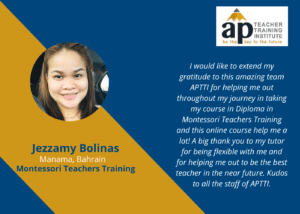Essential Components of Montessori Teacher Training
Definition of Montessori Teacher Training
Montessori Teacher Training is a unique way of teaching that gives people who want to become teachers the information and skills they need to create a stimulating learning environment based on the Montessori philosophy. Child-centered learning is an idea that says teachers should guide students instead of instructing them. This way of teaching helps students become independent and love learning. It is common for a Montessori Teacher Training Course to cover both theory and practice. This makes sure that teachers are well-equipped to use Montessori concepts in a variety of classroom settings.
Which Practical Components Are Central to the Training?
There are a few important practical parts of a Montessori Teacher Training Course that are necessary for good training. These parts include learning by doing, watching, and practicing teaching. Hands-on learning is very important because it lets future teachers work directly with Montessori tools. This exchange helps them learn how to show these things to kids, which helps them really understand how Montessori works. Watching experienced Montessori teachers work is another important part of observational practice. This observation helps trainees learn how to run a classroom and understand how children and teachers connect in a Montessori setting.
How Is Hands-On Learning Incorporated?
Interactive workshops and lab sessions make it possible for students to learn by doing in a full Montessori Teacher Training Course from a well-known teacher training institute. These are the times when trainers work with Montessori items like the Pink Tower, Sandpaper Letters and Math Beads. Their training teaches them how to give these tools to kids and help them learn on their own. This hands-on experience helps future teachers understand what each piece is for and how it works, so they can make a classroom that encourages kids’ natural curiosity and desire to learn. Detailled instructional films are often added to this part of the training, especially in Online Teacher Training programmes, to make sure that students who are learning from afar also get real-world experience.

What Role Does Observation Play in the Training?
One of the most important parts of becoming a Montessori teacher is observing. Trainee teachers spend a lot of time watching kids learn in Montessori classes and taking notes on how experienced teachers help the kids learn. Through this part of the teacher training course, students can see how the ideas they are learning are used in the real world, giving them examples of how Montessori methods work. By watching how a Montessori environment works, trainees learn to enjoy the little things that make kids act and the little ways that Montessori teachers help and guide their students. A lot of places that train teachers also use online observations, which are especially helpful for people who are in Online Teacher Training programmes.
How Is Practice Teaching Integrated into the Course?
Another important part of Montessori Teacher Training is practice training. Under the guidance of more experienced mentors, trainees play the part of the teacher. During these classes, trainees put their theoretical knowledge and practical skills to use in a controlled setting while getting feedback and help from experienced Montessori teachers. This experience is very helpful because it helps teachers improve their teaching methods, learn how to run a classroom, and feel more confident in their ability to run a Montessori classroom. Virtual classrooms and supervised teaching events can both give people in Online Teacher Training the chance to practise and get feedback.
Why Is a Holistic Approach Essential in Montessori Training?
The all-around approach of a Montessori Teacher Training Course makes sure that teachers not only understand the theory behind Montessori but also know how to use it in the real world. These classes teach teachers how to make classrooms that are safe, interesting, and meet each child’s developmental needs by combining hands-on learning, observation, and practice teaching. This all-around method is emphasised by schools that train teachers so that they can create students who are independent, confident, and lifelong learners. These useful parts are what make Montessori Teacher Training unique, and they make it an important investment for anyone who wants to become a Montessori teacher.
To sum up, Montessori Teacher Training is an in-depth, multifaceted journey that gives teachers the tools and information they need to change the way young children learn. Trainees are ready to lead with confidence and inspire young minds by combining what they learn in the classroom with what they do in the real world. The thoroughness of Montessori Teacher Training ensures that educators are well-prepared to support the values and methods of the Montessori philosophy in any classroom setting, whether they are taking traditional or Online Teacher Training Courses.


